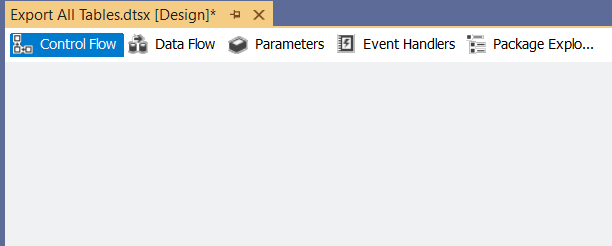Export all tables data to csv using SSIS
Step 1:
Create 4 variables as shown in bellow
Step 2:
Create new ado.net connection
Click on new to create connection
Provide server name and DB name
Click on OK
Step 3:
Rename connection name to DBConn as shown in bellow
Step 4:
Drag and drop script task
Edit
Select variables as shown in bellow
Click on edit script
Add new name spaces
using System.IO; using System.Data.SqlClient;
Under public void Main() {
I have added below code.
string datetime = DateTime.Now.ToString("yyyyMMddHHmmss"); try { //Declare Variables string DestinationFolder = Dts.Variables["User::DestinationFolder"].Value.ToString(); string FileDelimiter = Dts.Variables["User::FileDelimiter"].Value.ToString(); string FileExtension = Dts.Variables["User::FileExtension"].Value.ToString(); //USE ADO.NET Connection from SSIS Package to get data from table SqlConnection myADONETConnection = new SqlConnection(); myADONETConnection = (SqlConnection)(Dts.Connections["DBConn"].AcquireConnection(Dts.Transaction) as SqlConnection); //Read list of Tables with Schema from Database string query = "SELECT Schema_name(schema_id) AS SchemaName,name AS TableName FROM sys.tables WHERE is_ms_shipped = 0"; //MessageBox.Show(query.ToString()); SqlCommand cmd = new SqlCommand(query, myADONETConnection); DataTable dt = new DataTable(); dt.Load(cmd.ExecuteReader()); //Loop through datatable(dt) that has schema and table names foreach (DataRow dt_row in dt.Rows) { string SchemaName = ""; string TableName = ""; object[] array = dt_row.ItemArray; SchemaName = array[0].ToString(); TableName = array[1].ToString(); string FileFullPath =DestinationFolder +"\\"+ SchemaName+"_"+TableName + "_" + datetime+FileExtension; //Get the data for a table into data table string data_query = "Select * From ["+SchemaName+"].["+TableName+"]"; SqlCommand data_cmd = new SqlCommand(data_query, myADONETConnection); DataTable d_table = new DataTable(); d_table.Load(data_cmd.ExecuteReader()); StreamWriter sw = null; sw = new StreamWriter(FileFullPath, false); // Write the Header Row to File int ColumnCount = d_table.Columns.Count; for (int ic = 0; ic < ColumnCount; ic++) { sw.Write(d_table.Columns[ic]); if (ic < ColumnCount - 1) { sw.Write(FileDelimiter); } } sw.Write(sw.NewLine); // Write All Rows to the File foreach (DataRow dr in d_table.Rows) { for (int ir = 0; ir < ColumnCount; ir++) { if (!Convert.IsDBNull(dr[ir])) { sw.Write(dr[ir].ToString()); } if (ir < ColumnCount - 1) { sw.Write(FileDelimiter); } } sw.Write(sw.NewLine); } sw.Close(); Dts.TaskResult = (int)ScriptResults.Success; } } catch (Exception exception) { // Create Log File for Errors using (StreamWriter sw = File.CreateText(Dts.Variables["User::LogFolder"].Value.ToString() + "\\" + "ErrorLog_" + datetime + ".log")) { sw.WriteLine(exception.ToString()); Dts.TaskResult = (int)ScriptResults.Failure; } }
Step 5:
Execute script task
CSV files are got created in destination folder















The information you shared was useful. Thank you for taking the time to organize it.
ReplyDeleteThank you for your valuable feedback
DeleteReally good information to show through this blog. I really appreciate you for all the valuable information that you are providing us through your blog.
ReplyDeleteThanks for your feedback
DeleteI appreciate the time you spent finding that information
ReplyDeleteThanks for your feedback
DeleteThanks for your feedback
ReplyDelete